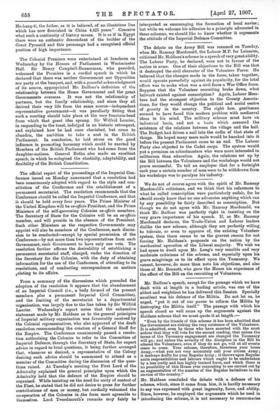The debate on the Army Bill was resumed on Tuesday,
when Mr. Ramsay Macdonald, the Labour M.P. for Leicester, criticised Mr. Haldane's scheme in a speech of very great ability. The Labour Party, he declared, were not in favour of the nation in arms. One of their objections to the Bill was that it destroyed the civil character of the Volunteer Force: He believed that the changes made in the. force, taken together, would operate powerfully against its popularity, for the total effect was to make what was a civil force a War Office force. Suppose that the Volunteer recruiting broke down, what bulwark existed against conscription P Again, Labour Mem- bers had the strongest objection to the County Associa- tions, for they would change the political and social centre of gravity in the country. The right hon. gentleman seemed to have faced this modern problem with mediaeval ideas in his mind. The military scheme must have an industrial basis, and not a baths which assumed the existence of the relations between the village and the hall. The Budget had driven a nail into the coffin of that state of things. He hoped many more nails would be knocked into it before the present Parliament came to an end. The Labour Party also objected to the Cadet corps. The system would put a premium on schoolmasters who were more interested in militarism than education. Again, the relations set up by the Bill between the Volunteers and the workshops would not prove successful. To tell an employer that for a fortnight each year a certain number of men were to be withdrawn from his workshops was to paralyse his industry.


























































 Previous page
Previous page